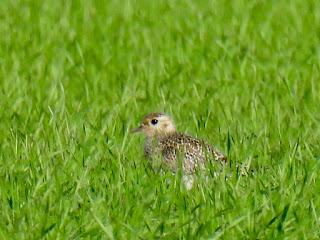The weather was so warm a few days back that I managed to wear shorts while working in the garden but it’s turned a bit cooler now and rain has replace the sunshine. The rain is light and intermittent though and it seems that we are in for a Spring without any flooded valleys to attract migrating waders and wildfowl. For me this means working my immediate patch more and perhaps giving less time to the area around the Tardoire and Bandiat rivers. I keep an eye on the nearby plains where the wind farm is located in the hope of an early wheatear or whinchat but so far there is usually nothing to report other than a few wintering meadow pipits and the usual skylarks and stonechat. There was a little excitement this week though when I came across a flock of about a hundred lapwings in a field of winter wheat and in among them were about a dozen golden plover.
Saturday, 5 March 2022
Golden Plovers and Spring in the Garden
perhaps thinking that they were more camouflaged and not even stirring when a female hen harrier passed over.
Nowhere is more immediate than one’s garden and there is quite a bit going on there at the moment. As I think I’ve mentioned before, the bird table remains busy and the wintering bramblings seem in no hurry to head back towards Scandinavia. The warming Spring has shifted the focus elsewhere though and within the last week or two the dawn chorus has grown louder as more individuals join the choir. I use the term ‘garden’ rather loosely here as although my garden covers about an acre much of the song comes from the surrounding woods and fields. Thrushes have been singing for a while but I was delighted to hear the beautiful sound of my first singing blackbird last week and he has now been joined by several others.
Robins are famous for singing all year and one is still doing so in the garden despite the sparrowhawk incident which I reported in my last post.
A less familiar song but a very distinctive one is that of the short-toed tree creeper and he was doing his bit as he moved up (but never down) the trunk of the old lime tree in the yard. Other contributions have come from the thin trill of the firecrest, the loud whistle of nuthatches and the occasional distant woodlark.
Green woodpeckers have become more vocal, great spotted are drumming and even the moorhens in the pond seem to be calling more often.
Cranes are worth a mention as they are still passing north and about four hundred have flown over the house on two different days this week.
Subscribe to:
Post Comments (Atom)


No comments:
Post a Comment